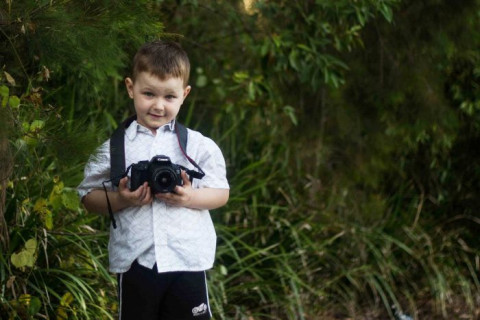
When Max was diagnosed with high-functioning autism a year ago, it just made sense to mum Danielle Pritchard.
The three-year-old Brisbane boy had been having troubles with his speech, anxiety, and social skills among other small quirks.
Ms Pritchard knew just how important early intervention would be. As a teacher, she's worked with children similar to her own son before.
With the right treatment and routine finally in place, Max started to come into his own.
Soon after that, Ms Pritchard decided to put a camera in the young boy's hands.
 Photo: Max has been experimenting with a camera the past few months. (Supplied: Max Pritchard)
Photo: Max has been experimenting with a camera the past few months. (Supplied: Max Pritchard)
Since then, the now four-year-old has been more focused, and able to better communicate with others, including his own family.
"When Max has the camera in his hand, he has an air of confidence around him," Ms Pritchard said.
"Taking the camera out in public has allowed me to teach him how to politely approach people to ask if he can take their photo and often results in great conversations and interactions with people."
In recent weeks, with the help of mum, Max has been sharing his work on Instagram, where he's got a small but respectful following close to 60 people, and growing.
"He's quite particular of what he wants to take photos of. If I suggest something he doesn't want to photograph, he tells me straight out," Ms Pritchard said.
"We have to weed through a number of blurry photos to find focused ones but his skills are improving daily on both a technical and social level," she said.
'Early intervention in autistic children is so important'
Max's passion for photography is a result of his early intervention following his Autism diagnosis, Ms Pritchard said.
Since the start of the year he's been attending an Early Childhood Development Program at Nursey Road State Special School in Brisbane.
Ms Pritchard said her son's experience was a prime example of how the right early intervention could help children diagnosed with autism.
"It actually took a little while to be diagnosed as I was seeing a psychiatrist who initially told me it was because I had postnatal depression and wasn't bonding with him properly," she said.
"It's been a hard slog over the past year, getting the diagnosis, the right treatments and routines in place to help him but I'm sure it will pay off in the end because we've been able to set great foundations for him to build on for when he goes to school and later in life.
"If Max hadn't had the early intervention that he has had, he still wouldn't know the colours or how to sit in a circle. He'd just be labelled as the naughty kid, and be a bit of a lost cause.
"Even without the photography, with the early intervention, it was just a few weeks ago he asked me what my favourite colour was. He's four, most kids are usually asking each other that sort of stuff by then, but he's never reciprocate a conversation, he's never come back with anything, and that just threw me."
 Photo: Max's mum is helping him nurture his photographic abilities. (Supplied: Max Pritchard)
Photo: Max's mum is helping him nurture his photographic abilities. (Supplied: Max Pritchard)
Ms Pritchard's seen it before in her line of work as a high school teacher.
"I've seen what happens when children don't get the right interventions and was terrified of this to happen to Max," she said.
"Early intervention is so important, especially when the child is so young and their brain is still malleable … the longer it's left, the harder it is to work with a child and their conditions."
Autism Awareness Australia CEO Nicole Rogerson said early intervention was of critical importance for young children on the autism spectrum.
Girls with autism flying under the radar

Most people tend to think of autism as a disorder that affects boys and men, but psychologists now believe that girls with autism may simply be better at hiding in plain sight.
"Parents are advised to seek out quality early intervention as soon as they have concerns about their child's development, even if they still may be waiting for a formal diagnosis. It is the 'early' in early intervention that is so important," Ms Rogerson said.
"As with most difficulties in life, if you catch them early and address them quickly it turns out to be much better in the long run.
"Research shows that intensive early intervention is one of the most effective treatments for children with autism and developmental delays. However, it is not just the quantity of therapy, it is also the quality."
Ms Rogerson said having a child engaged in active learning was the most important element of early intervention.
"You want to be able to break down skills and introduce them in teachable components and then allow your child the opportunity to practice, practice, practice those skills," she said.
Ms Rogerson said it seemed Max found his camera "as a tool to help him navigate the world around him".
"The results are a visual reminder that people with autism view the world differently, they see things we often don't notice," she said.
"Max's photographs are a peek into his world — and what a delight that is."
 Photo: Max can be very particular about what he photographs, his mother says. (Supplied: Danielle Pritchard)
Photo: Max can be very particular about what he photographs, his mother says. (Supplied: Danielle Pritchard)
from http://www.abc.net.au/news/2018-04-28/p…